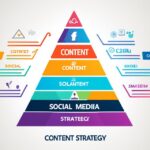Table of Contents
Content marketing is a crucial aspect of any business, but it’s essential to measure its success. Content marketing aims to attract and engage new customers by creating and sharing online content. It helps position your business as an expert in your field and provides answers to potential customers’ questions. To measure the success of your content strategy, you need to track key metrics such as traffic sources, impressions, click-through rate (CTR), content shares and backlinks, email opt-in rates, bounce rate, and keyword rankings. These metrics help determine the effectiveness of your content in attracting and engaging your target audience, improving your website’s visibility, and driving conversions and sales.
Why Content Marketing Metrics Are Important
Content marketing metrics play a vital role in evaluating the impact and effectiveness of your content marketing strategy. These metrics provide both quantitative and qualitative insights into the performance of your content, helping you make data-driven decisions to optimize your strategy. By tracking these metrics, you can assess how well your content attracts and engages your target audience, measure its visibility in organic search and social media, and understand the effectiveness of your SEO efforts.
Some of the key content marketing metrics include:
- Organic search traffic: Measures how well your content attracts your target audience through search engines.
- Views: Shows the number of times your content is accessed and viewed by users.
- Traffic sources: Provides insights into where your traffic comes from, such as search engines, social media, or referrals.
- CTR (Click-through Rate): Indicates how effectively your content prompts users to take action by clicking on a specific link or call-to-action.
- Social shares: Measures how often your content is shared on social media platforms, indicating its relevance and engagement level.
- Keyword rankings: Evaluates how well your content ranks in search engine results for targeted keywords.
- Backlinks: Indicates the number of reputable websites linking back to your content, increasing its authority and visibility.
By analyzing these metrics, you can gain valuable insights into your content’s performance, identify areas for improvement, and justify your marketing spend. Additionally, these metrics help you refine your content marketing strategy, enhance audience engagement, and drive better results for your business.
Tracking content marketing metrics is crucial for measuring the effectiveness of your strategy, optimizing your content’s performance, and achieving your marketing goals. With reliable and relevant data, you can make informed decisions and continually improve your content marketing efforts.
“The only way to know whether your content marketing efforts are successful is to measure the right metrics.”
Key Metrics for Measuring Content Marketing Effectiveness
To measure the effectiveness of your content marketing efforts, it is crucial to track specific metrics that provide valuable insights. The following key metrics play a vital role in measuring content marketing effectiveness:
- Organic Search Traffic: This metric shows how well your content attracts your target audience through search engines, highlighting your content’s visibility and reach.
- Impressions: Measuring the number of times your content is displayed to users provides an indication of its exposure and potential reach among your target audience.
- CTR (Click-through Rate): CTR reflects how effectively your content prompts users to take action by clicking through to your website, indicating the level of engagement and interest generated.
- Content Shares and Backlinks: The number of content shares and backlinks received demonstrates the value and relevance of your content, indicating its reputation and credibility among users and search engines.
- Email Opt-in Rates: This metric measures how effectively your content captures user information and encourages them to subscribe to your email list, facilitating ongoing communication and relationship-building.
- Bounce Rate: Bounce rate reveals how effectively your website retains visitors after they land on a page, indicating the level of engagement and satisfaction with your content.
- Keyword Rankings: Monitoring how well your content ranks in search engine results for targeted keywords allows you to assess its visibility and discoverability among your intended audience.
Tracking these metrics enables you to evaluate the visibility, engagement, and conversions generated by your content marketing strategy. By analyzing the data provided by these key metrics, you can make informed decisions to optimize and enhance the effectiveness of your content marketing efforts.
Example Table – Key Metrics Comparison
| Metric | Definition | Importance |
|---|---|---|
| Organic Search Traffic | Number of users attracted via search engines | Measures content visibility and reach |
| Impressions | Number of times content is displayed to users | Indicates exposure and potential reach |
| CTR (Click-through Rate) | Percentage of users who click on content | Reflects engagement and interest |
| Content Shares and Backlinks | Number of times content is shared and linked to | Demonstrates value and credibility |
| Email Opt-in Rates | Percentage of users subscribing via content | Facilitates ongoing communication |
| Bounce Rate | Percentage of users leaving after viewing a page | Indicates engagement and satisfaction |
| Keyword Rankings | Position of content in search engine results | Assesses visibility and discoverability |
Creating a Content Marketing Dashboard
A content marketing dashboard is a valuable tool for organizing and tracking your content marketing metrics. It provides a comprehensive view of key metrics, allowing you to effectively monitor your content marketing performance. By including metrics such as traffic sources, impressions, CTR, content shares and backlinks, email opt-in rates, bounce rate, and keyword rankings, your dashboard becomes a central hub for understanding the success of your content strategy.
Visualize Performance with a Dashboard
A content marketing dashboard visually presents your metrics, making it easy to analyze data, identify trends, and make informed decisions to improve your content marketing strategy. It offers a consolidated view of the key metrics that matter most to your business, enabling efficient monitoring and data-driven optimizations.
Customization and Regular Updates
It’s crucial to customize your content marketing dashboard according to your specific goals and objectives. By tailoring the dashboard to reflect the metrics that align with your strategy, you can gain meaningful insights into how well your content is performing. Regular updates with up-to-date metrics ensure accurate tracking and reporting.
Track Relevant Metrics
When building your content marketing dashboard, it’s essential to include a range of critical metrics. Traffic sources and impressions provide insights into how your content is being discovered and seen by your target audience. CTR measures the effectiveness of your content in driving user engagement. Content shares and backlinks reflect the value and reach of your content. Email opt-in rates demonstrate the effectiveness of your lead generation efforts. Bounce rate helps evaluate user engagement and website performance. Lastly, keyword rankings indicate how well your content is ranking in search engine results, impacting visibility and organic traffic.
By leveraging a content marketing dashboard, you can closely monitor your metrics, gain valuable insights, and drive data-based decisions to improve your content marketing strategy. Whether you need to adjust your content approach, refine your targeting, or optimize your SEO efforts, an effective dashboard empowers you to make informed choices for maximum impact and success.
Tips for Effective Content Marketing Measurement
Measuring the results of your content marketing activities requires careful planning and analysis. To ensure accurate measurement and gain valuable insights, consider the following tips:
1. Define Clear Objectives and Goals
Before you begin measuring the effectiveness of your content marketing efforts, it’s important to define clear objectives and goals. Determine what you want to achieve with your content, whether it’s increasing traffic, generating leads, or improving conversions. Clearly defined goals will guide your measurement strategy and help you track the right metrics.
2. Identify Key Performance Indicators (KPIs)
Identify the key performance indicators (KPIs) that align with your goals. These metrics will help you evaluate the success of your content marketing activities. Examples of KPIs include website traffic, engagement metrics (such as time on page and bounce rate), social media reach, conversion rates, and return on investment (ROI). Choose KPIs that provide meaningful insights into your content’s impact and audience engagement.
3. Utilize Analytics Tools
Make use of analytics tools to track and measure your content marketing metrics. Google Analytics is a popular and comprehensive tool that provides valuable data on website performance, user behavior, and traffic sources. Other tools like SEMrush, Moz, and HubSpot offer additional insights into keyword rankings, backlinks, and social media performance. Experiment with different tools to find the ones that best suit your measurement needs.
4. Set Up Conversion Tracking
To accurately measure the impact of your content marketing efforts on conversions, set up conversion tracking. This involves configuring goals in your analytics tool that align with your objectives. For example, if your goal is to increase newsletter sign-ups, set up a conversion goal for tracking the number of sign-ups generated from your content.
5. Monitor Engagement Metrics
Engagement metrics provide valuable insights into how your audience interacts with your content. Track metrics such as average time on page, page views per session, social media shares, and comments. These metrics help you gauge the level of interest and engagement your content generates.
“Effective measurement strategies are essential for understanding how your content marketing efforts contribute to your overall business goals.”
6. Regularly Analyze and Report on Your Metrics
Regularly analyze your content marketing metrics to identify trends, patterns, and areas for improvement. Use your findings to optimize your content strategy and make data-driven decisions. Create regular reports that highlight the performance of your content marketing efforts, and share these insights with key stakeholders to demonstrate the value of your work.
By following these tips for effective content marketing measurement, you’ll be able to gain a comprehensive understanding of your content’s impact, optimize your strategy, and achieve your marketing goals.
Conclusion
Measuring the success of your content strategy is crucial for evaluating its effectiveness, enhancing audience engagement, and achieving your marketing and business objectives. By effectively tracking key metrics such as traffic sources, impressions, click-through rate (CTR), content shares and backlinks, email opt-in rates, bounce rate, and keyword rankings, you can gain valuable insights into the visibility, engagement, and conversions generated by your content marketing efforts.
To ensure accurate measurement and analysis, it is recommended to create a content marketing dashboard and follow effective measurement strategies. This will enable you to monitor and evaluate your metrics, make data-driven decisions, and continuously enhance your content marketing strategy.
Remember, as your goals evolve, it is crucial to adapt your metrics and leverage industry knowledge to stay ahead in the competitive landscape. By maintaining proper measurement practices and optimizing your content strategy, you can unlock the secrets to content strategy success and elevate audience engagement with your brand.
FAQ
How do I measure the success of my content strategy?
To measure the success of your content strategy, you need to track key metrics such as traffic sources, impressions, click-through rate (CTR), content shares and backlinks, email opt-in rates, bounce rate, and keyword rankings.
Why are content marketing metrics important?
Content marketing metrics provide valuable insights into your content’s performance, such as organic search traffic, views, traffic sources, CTR, social shares, keyword rankings, and backlinks. These metrics help you assess how well your content attracts and engages your target audience, measure your content’s visibility in organic search and social media, and understand the effectiveness of your SEO strategy.
What are the key metrics for measuring content marketing effectiveness?
The key metrics for measuring content marketing effectiveness include organic search traffic, impressions, CTR, content shares and backlinks, email opt-in rates, bounce rate, and keyword rankings. These metrics help evaluate the visibility, engagement, and conversions generated by your content marketing strategy.
How can I create a content marketing dashboard?
To create a content marketing dashboard, include metrics such as traffic sources, impressions, CTR, content shares and backlinks, email opt-in rates, bounce rate, and keyword rankings. Having these metrics visually displayed in a dashboard allows you to easily analyze data, identify trends, and make informed decisions to improve your content marketing strategy.
What tips can you provide for effective content marketing measurement?
Some tips for effective content marketing measurement include careful planning and analysis, tracking specific metrics such as organic search traffic and keyword rankings, customizing your content marketing dashboard, and regularly updating it with up-to-date metrics for tracking and reporting purposes.
How does measuring the success of my content strategy benefit my business?
Measuring the success of your content strategy is essential for understanding its effectiveness, improving engagement, and achieving your marketing and business goals. By tracking key metrics, you can evaluate the visibility, engagement, and conversions generated by your content marketing efforts and make data-driven decisions to improve your strategy.













